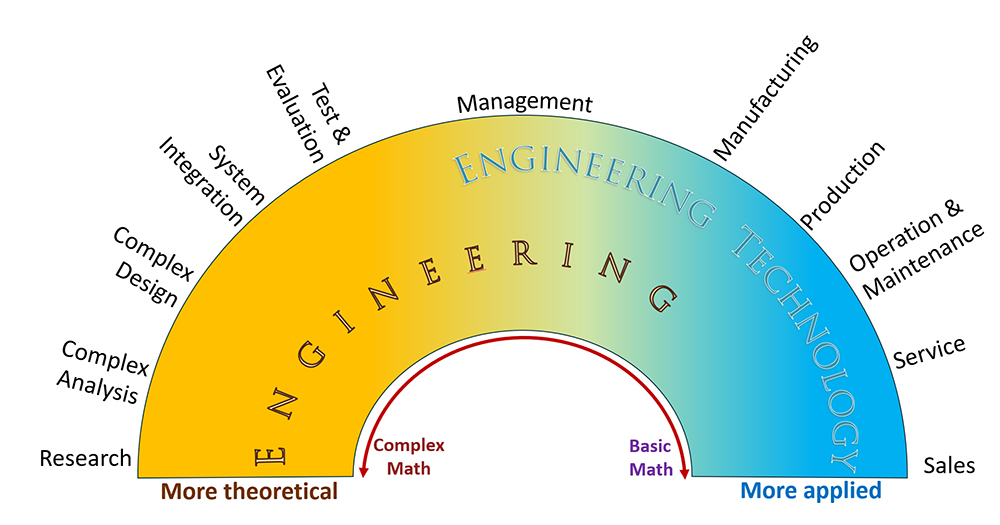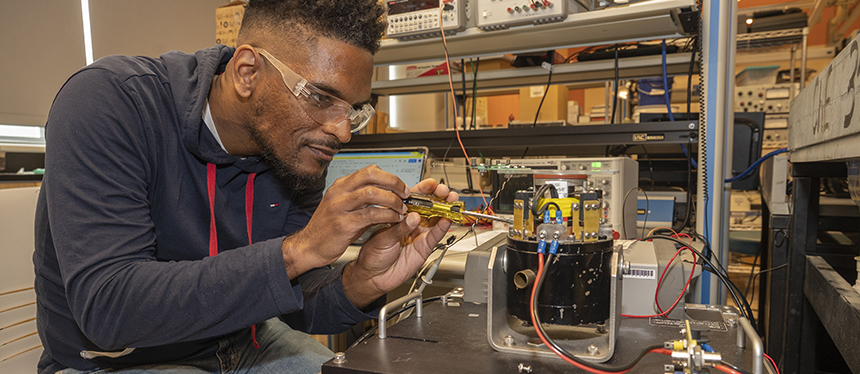B.S. in EET
B.S. in EET
B.S. in Electrical Engineering Technology at Rowan University
The Bachelor of Science (B.S.) in Electrical Engineering Technology (EET) program is a unique, four-year, career-oriented program with two distinct paths: a traditional four-year degree program offered by the Electrical & Computer Engineering (ECE) Department and a 2+2 degree completion/transfer program that seamlessly allows students to obtain their bachelor’s degree after completing their Associate of Applied Science degree in Electrical Engineering Technology or a closely related field from most community-colleges with engineering technology and related programs.
This new program has many innovative components that make it unique, starting with its engineering & technology clinics. For students in the traditional 4- year program, the eight-semester Engineering & Technology Clinics – and for students in the 2+2 program, the four-semester Technology Clinics – provide students with genuinely hands-on, interdisciplinary experience with design, development, and implementation, enabling students to work on real-world problems. A college-wide effort within the Henry M. Rowan College of Engineering, the Clinics provide access to over 120+ multidisciplinary projects across the College every semester, allowing the students to work with other students from any of the several engineering programs with the College.
The B.S. in EET curriculum also includes several strategically selected and designed courses, including Embedded Systems and Internet of Things, Applied Digital Signal Processing and Applied Communication Systems, Electrical Power and Energy Systems, Professionalism and Consulting in Engineering, and Printed Circuit Board Design, Rapid Prototyping and Fabrication, the latter taking advantage of our state-of-the-art rapid prototyping and fabrication laboratory. The program also provides a large selection of technical electives every semester.
Collectively, these courses provide an exceptional background, knowledge, and skillset, preparing graduates for a broad spectrum of career opportunities. These opportunities include jobs such as:
![]() Design, development and manufacturing of products, machines, and processes
Design, development and manufacturing of products, machines, and processes
![]() Operations
Operations
![]() Technical Sales
Technical Sales
![]() High-income Consulting
High-income Consulting
There are many industries that hire electrical engineering technologists, including but not limited to power, electronics, biotechnology, imaging, computer, defense, aerospace, automotive, telecommunications, manufacturing, robotics, and automation—all of which are well-represented in our geographical area.
The Electrical Engineering Technology program provides the option of a 4-year program that takes advantage of all the resources and facilities the ECE Department, the College of Engineering, and the University provides, along with the convenience and lower cost of completing A.A.S. degree requirements at your local community college with access to Rowan University resources during the third and fourth years of the program.
Electrical Engineering Technology (EET) vs. Electrical and Computer Engineering (ECE)
Both programs provide an exceptional preparation to electrical engineering, they both emphasize hands-on learning through our renowned and award-winning engineering clinics, and graduates from both fields go on to work in similar industries such as power systems, automation, electronics, telecommunications and AI.
You may be wondering about the difference between the two programs: while ECE focuses more on complex design, system integration, and advanced research with a demanding advanced math course sequence, EET is a highly applied, hands-on discipline that emphasizes manufacturing, production, operation, and implementation of engineering solutions with a more accessible, gentler math curriculum. The following diagram shows how engineering and engineering technology are two parts of a spectrum.

That is not to say an engineering graduate cannot work in manufacturing or production or sales, nor does it mean an engineering technology graduate cannot work in system integration, test & evaluation or research. This diagram simply reflect the general trends that most engineering graduates are more involved in complex design and analysis based on the more complex math thay have seen, whereas more engineering technology graduates work on the right side of the spectrum due to their more applied training.
Simply put, an EET program allows you to be immersed in the exciting and cutting-edge world of electrical engineering, gaining the more practical and applied skills that employers highly value.
